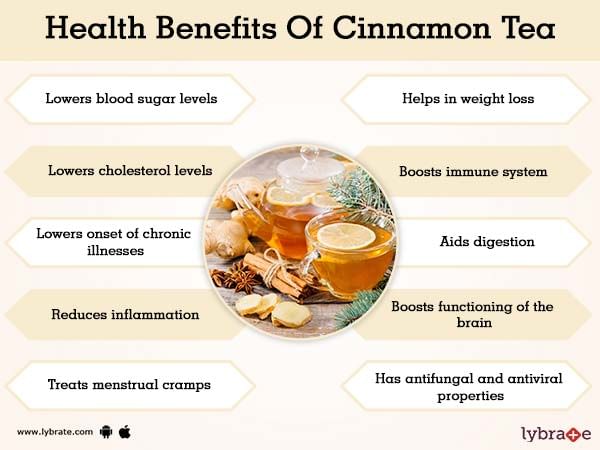Cinnamon tea contains a wealth of antioxidants and has the potential to deliver various health benefits, such as reducing inflammation, and blood sugar levels, promoting cardiovascular wellness, combating infections, and potentially facilitating weight loss.
The abundance of beneficial compounds in cinnamon tea can potentially provide numerous health advantages, such as supporting weight loss, enhancing cardiovascular health, alleviating menstrual cramps, and reducing inflammation and blood sugar levels.

The recognizable cinnamon sticks are made by drying the inner bark of the cinnamon tree, which naturally curls into rolls. To make the tea, the sticks can be steeped in boiling water or ground into a powder before use.
Ready to start sipping? Here are 5 potential perks of drinking cinnamon tea.
- Good source of antioxidants
Cinnamon tea contains a wealth of antioxidants that can help counteract the harmful effects of free radicals linked to health problems such as cancer, heart disease, and diabetes.
Polyphenol antioxidants are particularly abundant in cinnamon, and research has demonstrated that drinking cinnamon tea can boost your body’s overall antioxidant capacity (TAC).
One study conducted in 2018 even suggested that cinnamon extract could serve as a natural alternative to synthetic antioxidants in food products, thereby improving health and nutrition. However, further research is needed to determine the effectiveness of cinnamon in tea form.
- Helps your heart
Research suggests that consuming cinnamon may have potential benefits for heart health. Studies have shown that cinnamon can help relax blood vessels, lower blood pressure, increase HDL (good) cholesterol levels, improve blood circulation, and reduce blood triglycerides and total cholesterol levels.
However, it’s important to note that cinnamon should not be considered a cure for heart disease alone. Rather, it may be a useful addition to a healthy diet and lifestyle for reducing the risk of certain heart conditions.
- It may promote weight loss
Many people believe that cinnamon can naturally help with weight loss, but the evidence is unclear. Some studies suggest that cinnamon can aid in reducing waist circumference and fat mass. For example, an older study found that taking 10 g (or 5 teaspoons) of cinnamon powder every day for three months resulted in a loss of 0.7 percent of fat mass and a gain of 1.1 percent of muscle mass. However, it is unclear whether lower doses of cinnamon, such as those found in cinnamon tea, can have a similar effect. More research is needed to determine the effectiveness of cinnamon in promoting weight loss.
- Reduces inflammation
Cinnamon has been shown to potentially help with joint swelling and reduce inflammation markers, which could benefit people with inflammatory conditions such as asthma, ulcerative colitis, Crohn’s disease, and rheumatoid arthritis. It may also positively affect conditions where inflammation is a risk, such as cancer and heart disease. However, more research is needed to determine the extent of cinnamon’s effectiveness on its own.
- Fights fungus
Research indicates that cinnamon extract has potent antifungal properties, and some people use it as a home remedy for foot fungus or skin fungal infections. However, it’s uncertain whether drinking cinnamon tea will provide the same benefits as cinnamon extracts.
Furthermore, cinnamon may only be effective against minor fungal infections. If your infection persists for over a few days, it is still advisable to consult a doctor.
Risks of drinking cinnamon tea
While cinnamon tea is generally safe to drink, there are still some risks to keep in mind:
- Liver damage: Cassia (aka regular) cinnamon contains coumarin. This compound has been known to cause liver damage when consumed in excess.
- Oral lesions: Folks with cinnamon sensitivity might experience oral ulcers or lesions. This is prob because cinnamon contains cinnamaldehyde, which can trigger allergic reactions.
- Low blood sugar: Eating cinnamon can help lower your blood sugar, but consuming too much might lead to low blood sugar.
- Medication interactions: Before adding cinnamon tea to your diet, you should talk with a healthcare professional. Cinnamon is known to interact with certain medications, especially those used to treat liver conditions or diabetes.
:max_bytes(150000):strip_icc()/cinnamon_annotated-52ccf50e0d984b3ea356147153173a1f.jpg)
How much (and how often) to drink
Commercial teas often use Cassia cinnamon which contains coumarin. A teaspoon of ground Cassia cinnamon contains 7 to 18 g of coumarin, which exceeds the daily limit of 5 mg for a 130-pound person.
Some cinnamon tea brands do not provide the exact amount of coumarin per serving, so choosing a high-quality brand that provides detailed dosage information is best.
Here’s how to make cinnamon tea:
You can easily make cinnamon tea with a few simple ingredients. Here’s how:
- Fill a pot with 2 cups of water.
- Add 2 cinnamon sticks.
- Bring to a boil.
- Remove cinnamon sticks.
- Pour the tea into a large cup.
Pro tip: Add a tablespoon of honey, a squeeze of lemon, or a splash of your favorite milk for a delicious flavor.


